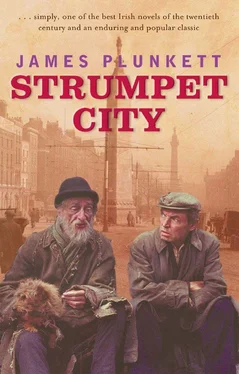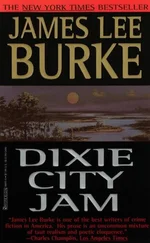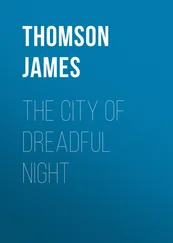Below the catwalks and weblike ladders the men still on duty sweated over the furnaces. Here there was a forsaken, steel-cold emptiness, a half-lit gloom. To his right the river was grey and wrinkled under the wind, the waiting ships as yet not clearly discernible. Fitz noted with surprise that it was almost dawn. He imagined he could smell it: a distinctive odour of metal and river and many cargoes, the cold and hungry smell of the dockside. A ship hooted, getting up steam. That meant an early tide. The sound hit the iron roof above him, then drifted off across streets and alleyways, startling the sleepy gulls and foraging cats. It had barely died away when the pipes near Fitz lurched suddenly and began to dance. The pump was working. He took his time negotiating the ladders. They were narrow and dangerous for someone who had been eighteen hours on duty.
When Fitz reported to Carrington again it was morning. The lighting set had been dismantled, the men looked haggard and hungry. Looking at them as they worked, Fitz was filled suddenly with pity. The wind and the cold had been an unremitting hardship, the steam and ash had attacked their eyes and added their own brand of torture. Yet except for Mulhall’s enquiry they continued to work without questioning what they were to get at the end of it. For most of them anyway, anything earned would be regarded as a godsend.
‘How about payment?’ he asked Carrington.
‘I’ll leave the list with the pay clerk before I go home. Tell them to call back about four o’dock.’
‘What am I to tell them about the overtime rate?’
‘Up in Nellie’s room,’ Carrington said.
‘There’ll be trouble.’
‘The casuals don’t matter—they’ll take what they’re given. The carters are more dangerous. But they have no case. They’re only entitled to overtime if they’ve worked for us during the day. These didn’t. They were working for Doggett & Co.’
‘I hope they understand that piece of reasoning,’ Fitz said.
‘There’s nothing they can do about it, anyway,’ Carrington said. ‘They’re not employed normally by us, so they can’t very well go on strike.’
Fitz went home with Pat Bannister. They made tea, washed and lay down to sleep. Meanwhile the rest of the city got into the swing of yet another day.
‘You wished to see me?’ Father O’Connor said.
His new parish priest, Father Giffley, looked around and said testily: ‘Please don’t stand with the door knob clasped in your fist—it’s a habit I detest.’
He saw Father O’Connor’s flush of embarrassment and added: ‘It lets the raw air into the room. Come in and sit down.’
He was seated in a leather armchair with a high back, his feet stretched out to the fire. On a table, which for comfort he had drawn over to the fireplace, the remains of his breakfast lay scattered: the peeled skin of an orange, a porridge bowl with its milky residue; a plate with egg stains and the stringy rinds of bacon.
Father O’Connor sat down facing him. Through a high window opposite he could see the walled yard at the back of the church and a section of railway line. The Church of St. Brigid lay near the railway and the canal. It was an unattractive view which the overcast sky and the spattering sleet did nothing to improve. The glass wore a thick grime, the inescapable grime of the neighbourhood.
‘Yes,’ Father Giffley said. ‘I wanted to see you—would you care for some whiskey?’
‘No, thank you,’ Father O’Connor said.
‘A follower of Father Mathew?’
‘No, Father.’ He was about to add that eleven o’clock in the morning seemed a little on the early side for heavy spirits, but realised in time that that might be interpreted as a reflection on his superior’s habits. He found them disturbing.
‘Then you might pour some for me,’ Father Giffley ordered. ‘The bottle is at your elbow.’
He had grey, spiky hair and a red face which the heat of the fire had roused to a steaming glow. Father O’Connor poured the whiskey and shuddered at the smell. In a few weeks he had grown to associate the smell of whiskey and the smell of peppermint sweets. His superior’s breath was always heavy with one or the other—or both.
‘You treat it very gingerly, very gingerly indeed,’ Father Giffley boomed at him. ‘Liberality, man. Don’t stint it.’
Father O’Connor withdrew the glass he had been in the act of extending to his superior and poured in a further supply.
‘That’s better,’ Father Giffley said. ‘That’s a more likely looking conqueror of a raw morning.’ He screwed up his eyes, regarding the glass with approval. He had water beside him with which he diluted the sizable measure. Then he drank, made an approving sound with his lips and pursued:
‘You have been with me for some weeks, Father . . .’
‘Six,’ Father O’Connor supplied.
‘Six,’ Father Giffley repeated. The number seemed to give him material for reflection. He gazed for quite a while into the fire, his eyes bulging and bloodshot. He had the habit, when thinking, of grunting and breathing laboriously.
‘The thing that puzzles me is how you came here.’
‘It was my own wish, Father.’
‘So I have been told—but why?’
‘I felt the life in a rich parish too easy. It was not what God called me to the priesthood for.’
‘Do you find the work here more . . . elevating?’
‘It is more arduous, Father. It requires more humility.’
Father Giffley stared at him over his whiskey and left it down without tasting it.
‘Ah—I see. Humility. So that’s the coveted virtue.’
‘I beg your pardon, Father?’
Father Giffley made a sound of impatience. This time he compensated for his previous abstinence and almost emptied the glass.
‘You are full of polite catch-phrases. You beg my pardon; you ask may you come in; I offer you whiskey and you act as though I had told you a bawdy story. I asked you to see me this morning because, frankly, I found it quite impossible to understand what brought you here.’
‘I don’t follow you, Father.’
Father O’Connor was trembling, not with rage, but confusion. His superior terrified him.
‘I am bound to tell you that if you think you’ve come to a good place for the exercise of your priestly office you’ve made a stupid mistake. It is my duty as your parish priest to put you on the right track.’
‘I was not aware that I was displeasing you,’ Father O’Connor said.
‘Displeasing me? Not a bit. Thank God I have not lived in the stink of one slum parish after another without finding ways and means of insulating myself. I am merely warning you of the situation. You have met Father O’Sullivan?’
Father O’Connor had. It was Father O’Sullivan, not Father Giffley, who had instructed him in the parish routine, shown him where vestments and vessels were kept, wished him a happy stay in the parish and hoped he would like the parish priest. He had said that with a sad, shy smile which betrayed that he found Father Giffley just a little bit odd. He was a stout, grey-haired man himself, much given to vigils at the Altar of Our Lady of the Immaculate Conception. After that first, routine exposition of the workings of St. Brigid’s his conversations with Father O’Connor, though pleasant and friendly, were few.
‘You must study Father O’Sullivan,’ Father Giffley said. ‘While you are here you must follow his example, not that of your parish priest.’
Father O’Connor failed to hide his embarrassment.
‘Really . . . Father,’ he managed.
‘I am trying to help you.’
Screwing up his courage, Father O’Connor faced his superior and said: ‘There is one way in which you could help me very much.’
Читать дальше












